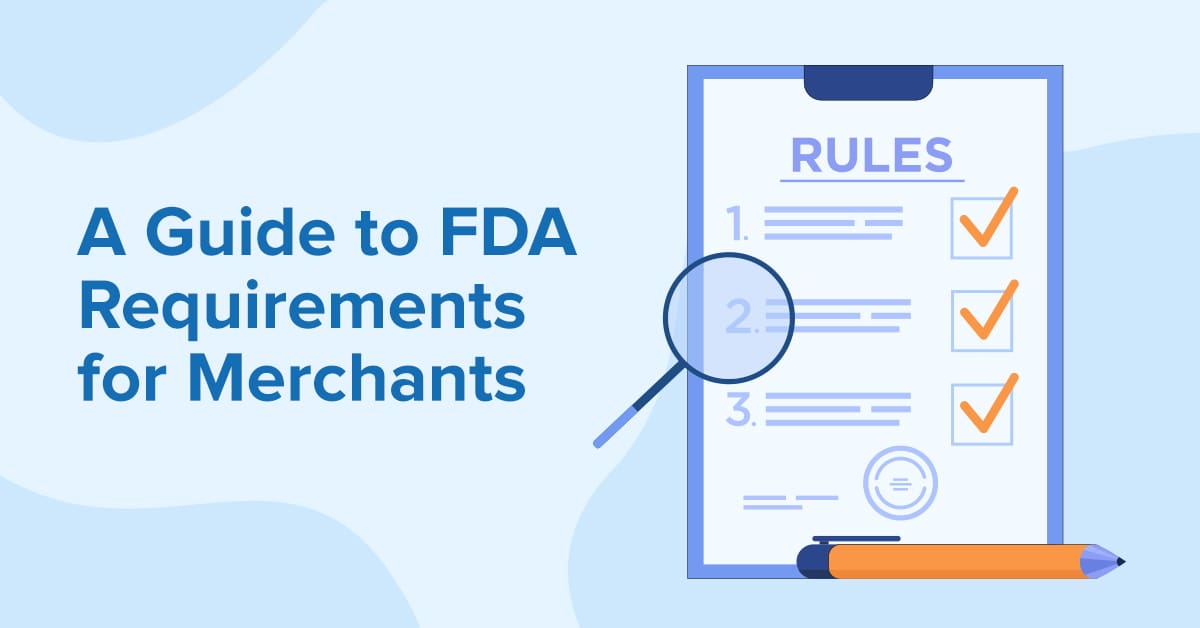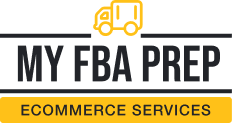
A Guide to FDA Requirements for Merchants

Experts predict online grocery sales will reach a staggering $160.91 billion in 2023, and the number of digital grocery buyers nationwide is expected to hover around 147.8 million. This considerable increase in online orders amplifies the demand for superior-quality food warehouses and reliable fulfillment partners to deliver consumables.
As a merchant, your warehousing selection must align with the high expectations of this booming online marketplace.
The Food and Drug Administration (FDA) is a pivotal ally in ensuring the health and safety of consumers across the United States. They ensure your customers receive safe, hygienic, and accurately labeled products.
Finding an FDA-compliant warehouse is essential, as it affects the integrity of your products, the trust of your customers, and your brand reputation. A single food safety incident can shake up (or, worse, ruin) a brand, so FDA compliance in your supply chain, including warehousing, is paramount.
Keep reading as we simplify the selection process so you can contract with warehouses that excel in FDA-compliant food handling and storage.
What does the FDA regulate?
The FDA’s expansive regulatory authority intersects with several other government agencies’ jurisdictions. That overlap often leads to confusion among consumers seeking to identify the correct regulatory agency to contact.
Here’s a brief list of product categories that the FDA traditionally regulates:
- Food and beverage products: Food-related products, including dietary supplements, food additives, bottled water, infant formulas, and more
- Pharmaceutical products: Both prescription drugs (brand-name and generic) and non-prescription (over-the-counter) drugs
- Biological products: Human vaccines, blood and blood products, cellular and gene therapy products, tissue and tissue products, and allergenics
- Medical devices: From simple items like tongue depressors and bedpans to complex technologies such as heart pacemakers, dental devices, surgical implants, and prosthetics
- Electronic products emitting radiation: Items that emit radiation, such as microwave ovens, X-ray equipment, laser products, ultrasonic therapy equipment, mercury vapor lamps, and sunlamps
- Cosmetic products: Color additives found in makeup and other personal care products, skin moisturizers and cleansers, nail polish, and perfumes
- Veterinary products: Livestock feeds, pet foods, and veterinary drugs and devices
- Tobacco products: Cigarettes, roll-your-own tobacco, smokeless tobacco, cigars, hookah, and e-cigarettes (both tobacco and non-tobacco-derived nicotine)
Note that, while these categories are broad, they’re not exhaustive, and the FDA’s jurisdiction may extend beyond them.
Understanding FDA requirements for warehouses
FDA regulations for food and beverage storage cover various aspects, including sanitation, temperature control, pest management, and more. Understanding these requirements is crucial for maintaining the safety and quality of your products during storage.
1. Registration with the FDA
First, you must complete FDA registration for your facility. The FDA doesn’t charge a registration fee, and the initial sign-up is a one-time process.
“FDA approval” is primarily granted to specific products, such as drugs or additives, not to companies, buildings, laboratories, or manufacturers. However, the FDA retains the right to inspect regulated facilities to ensure their adherence to the relevant manufacturing laws.
2. On-site inspections
Food storage facilities are subject to regular on-site inspections from the FDA. The enactment of the Food Safety and Modernization Act (FSMA) in 2011 increased the frequency of these inspections for food manufacturers, processors, and holders. How often they occur is based on a food facility’s categorization into either high-risk and non-high-risk operators. The criteria for this determination include:
- The identified safety risks associated with the food items you handle: For instance, if you sell only prepackaged, shelf-stable foods, you’re more likely to be labeled a non-high-risk food warehouse than a facility handling raw shellfish.
- The facility’s past record of compliance with FDA regulations: A facility with a history of adhering to rules is likely to be viewed as less of a risk than one with previous violations.
- The quality of the facility’s hazard analysis and risk-based preventive controls (HARPC): A comprehensive and robust HARPC plan can encourage a lower risk level.
- Any other criteria the FDA deems necessary and appropriate for the allocation of inspection resources: The FDA can introduce new standards for differentiating high-risk facilities from others as needed.
If you’re uncertain whether your food warehouse falls in the “high-risk” category, contact the FDA’s Center for Food Safety and Applied Nutrition.
According to the FSMA, the FDA will inspect domestic, high-risk food-holding facilities at least every three years. Meanwhile, if your facility is categorized as non-high-risk, you can expect FDA inspections at least once every seven years.
3. HARPC strategy
Food-grade warehouses must devise, uphold, and present an in-depth HARPC strategy to the FDA.
A HARPC strategy is a written blueprint outlining procedures to mitigate opportunities for foodborne illnesses to arise within facilities that handle food, which includes warehouses and distribution centers. This plan should include:
- An assessment of potential risks related to food safety within the facility
- An established set of actions, processes, or controls to decrease (and, ideally, eradicate) each hazard
- A strategy for monitoring how effective the facility’s hazard controls are
- Protocols for maintaining records related to hazard monitoring
- Explicit steps that the operation will undertake to rectify any food hazards that arise
4. Federal sanitary operation standards
Warehouses certified for food storage have to adhere to federal sanitary operation standards. These practices, contained within the Code of Federal Regulations, state:
- Operators must preserve all structures, facilities, and equipment in a “clean and sanitary condition” that averts cross-contamination.
- Sanitation supplies need to be “safe and adequate.” Cleaning solutions, the only toxic chemicals permitted in a food-grade warehouse, are allowed only if they’re necessary for maintaining sanitation.
- Unwanted pests, such as insects and rodents, are prohibited in a food-grade warehouse.
- Operators must ensure all food-contact surfaces — including tools, utensils, material handling equipment, and tabletops — are cleaned frequently enough to prevent contamination and cross-contact with allergens.
- Even surfaces that don’t come into direct contact with foods must be cleaned and sanitized.
Facilities are also required to possess infrastructure for cleaning, including hand-washing and surface sanitation. That encompasses a water supply, plumbing, sinks, and an effective waste-handling system.
The importance of FDA requirements
FDA requirements may seem like tedious box-ticking, but they’re meant to protect food safety — a significant factor in earning and keeping customers’ trust. Consumers prioritize the integrity of the foods they consume, so your commitment to meeting FDA standards is crucial to elevate your brand’s reputation and grow your following.
Not to mention, failing to abide by FDA regulations can have severe repercussions ranging from fines to store closures. A lack of compliance can also lead to food contamination, which creates health risks for consumers and damages your brand reputation.
Choosing an FDA-compliant warehouse
When selecting the right warehouse for your consumables, take your time and be overly critical.
Research potential warehouses extensively, focusing on their track records of compliance and any previous audit reports. Look for solid evidence of their adherence to FDA regulations.
Questions to ask when selecting a warehouse
Crucial questions to ask during the warehouse selection process include:
- What measures are in place to ensure FDA compliance?
- What pest control methods are employed?
- How are product recalls handled?
- What steps are taken to prevent cross-contamination?
- What emergency procedures are in place?
What to look for during the warehouse walkthrough
A physical inspection of a potential warehouse is your opportunity to verify the information you’ve received on it.
Observe the overall organization and cleanliness of the storage areas. Check the operational state of temperature control systems, and ensure there are clear demarcations for allergenic or potentially cross-contaminating materials.
HACCP certification
Hazard Analysis Critical Control Points (HACCP) certification is a globally recognized food safety standard. You can feel confident that warehouses with HACCP certification are committed to minimizing the risk of food safety hazards.
Be aware though that, while HACCP is excellent for food safety, its primary focus is on pre-packaged goods. It doesn’t address direct food handling; that has its own set of requirements.
MyFBAPrep has a host of HACCP-certified warehouses in-network. These facilities are ideal for storing pre-packaged goods and adhering to stringent safety standards, offering you peace of mind.
Keeping up with regulations and compliance
Whether you’re a seasoned merchant or a newcomer to the industry, staying in line with regulations is non-negotiable for your business. Let’s explore how to keep up with changes to ensure ongoing compliance.
Regular audits and regulatory updates
Audits are the backbone of a robust compliance strategy, serving as preventive maintenance to avoid costly regulatory violations.
Conduct audits of your warehouse operations regularly to identify and correct any gaps in FDA compliance. During them, you should:
- Review the warehouse’s adherence to food safety practices, employee training records, and standard operating procedures.
- Evaluate how the warehouse handles potential contaminants, pest control, and waste management.
- Assess the cleanliness of the facility, the functionality of equipment, and the efficiency of inventory management systems.
All of these aspects directly affect your warehouse’s ability to abide by FDA regulations.
Adding to the complexity, these requirements aren’t static; they continually evolve based on new research, technological advancements, and lessons learned from food safety incidents. Therefore, it’s vital to stay informed about any changes or updates to FDA standards.
Remember, ignorance of a rule change doesn’t exempt you from compliance. Subscribe to FDA announcements, participate in industry forums and workshops, and routinely check the FDA’s official website so you’re not left in the dark.
Wrapping up — The importance of meeting FDA requirements in eCommerce
An FDA-compliant warehouse is a strategic business decision that directly impacts your brand’s reputation, customer trust, and success. It offers assurance that your products are stored safely and handled correctly.
Finding a warehouse that satisfies eCommerce FDA requirements doesn’t have to be a daunting task if you have the right help. MyFBAPrep simplifies this process, serving as a trusted partner in your quest for reliable, FDA-compliant warehousing. With our robust network, including warehouses that meet FDA and HACCP standards, we can support your food and beverage storage needs.
Safety must come first when selling consumables. Be strict in following the rules so you’ll feel confident in your operations, from acquisition to the final sale.


